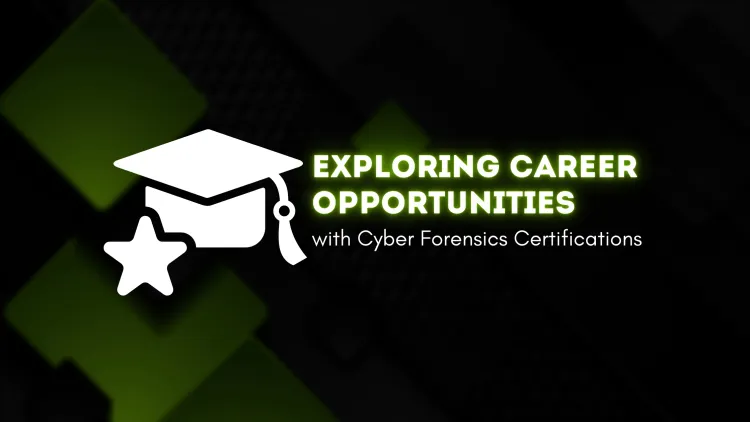Exploring Career Opportunities with Cyber Forensics Certifications
Earning the right cyber forensics certifications can significantly enhance your career prospects in this high-demand field. From foundational credentials like CCFE to advanced certifications like GCFA, these programs provide the necessary skills to excel in roles such as Digital Forensic Analyst, Incident Responder, and Malware Analyst. By choosing the appropriate certification and gaining hands-on experience, you can secure a rewarding and impactful career in cyber forensics.

In the fast-paced world of cybersecurity, cyber forensics has emerged as a crucial domain. It involves analyzing digital evidence to investigate cybercrimes, resolve data breaches, and ensure justice. To excel in this field, earning the right cyber forensics certifications can open doors to numerous career opportunities. In this blog, we’ll explore the potential career paths, in-demand certifications, and how they can shape your journey in digital forensics.
Why Cyber Forensics is a Promising Career Path
The rise of cybercrime has heightened the demand for skilled cyber forensics professionals across industries. Organizations increasingly rely on certified experts to safeguard sensitive data, investigate incidents, and comply with legal requirements.
Benefits of a Career in Cyber Forensics
- High Demand: Cyber forensics professionals are essential in law enforcement, government agencies, and private corporations.
- Competitive Salaries: Certified experts command lucrative pay due to their specialized skills.
- Diverse Roles: Opportunities range from Digital Forensic Analysts to Incident Responders and Malware Analysts.
- Job Security: As cyber threats evolve, the need for qualified forensics experts continues to grow.
Top Cyber Forensics Certifications to Kickstart Your Career
1. Certified Computer Forensics Examiner (CCFE)
- Overview: Recognized globally, the CCFE focuses on foundational forensics skills.
- Key Skills: File recovery, evidence documentation, and legal processes.
- Career Roles: Digital Forensic Technician, IT Forensics Analyst.
2. GIAC Certified Forensic Analyst (GCFA)
- Overview: This certification is ideal for those handling advanced incident response.
- Key Skills: Disk forensics, memory analysis, and malware reverse engineering.
- Career Roles: Incident Responder, Cyber Forensics Investigator.
3. EnCase Certified Examiner (EnCE)
- Overview: A certification for mastering EnCase, a leading forensic tool.
- Key Skills: Evidence collection, data preservation, and reporting.
- Career Roles: Digital Evidence Analyst, Forensics Consultant.
4. Certified Digital Forensics Examiner (CDFE)
- Overview: This course emphasizes investigation methodologies and reporting.
- Key Skills: Chain of custody, advanced file analysis, and incident handling.
- Career Roles: Cybercrime Investigator, Security Analyst.
5. CHFI (Certified Hacking Forensic Investigator)
- Overview: Offered by EC-Council, this certification prepares professionals to detect and investigate hacking attempts.
- Key Skills: Network forensics, data breach analysis, and system auditing.
- Career Roles: Cyber Forensics Specialist, Security Consultant.
Career Opportunities with Cyber Forensics Certifications
1. Digital Forensic Analyst
Responsible for examining computers, networks, and devices to uncover evidence of cybercrimes.
2. Incident Responder
Handles security breaches by analyzing incidents and preventing future attacks.
3. Malware Analyst
Focuses on identifying, studying, and mitigating malware threats.
4. Cybercrime Investigator
Collaborates with law enforcement to investigate and resolve cybercriminal activities.
5. Security Consultant
Advises organizations on cybersecurity best practices and forensic readiness.
6. Information Security Manager
Leads teams to implement security strategies and manage forensics processes.
How Cyber Forensics Certifications Boost Your Career
- Enhanced Credibility: Certifications demonstrate your expertise to employers.
- Skill Validation: Recognized credentials prove your proficiency in forensic tools and methodologies.
- Increased Employability: Certified professionals are preferred by employers in sensitive roles.
- Career Advancement: Certifications often lead to higher positions and salaries.
FAQs
-
What are the best certifications for beginners in cyber forensics?
CCFE and CHFI are excellent starting points for beginners. -
Do certifications guarantee a job in cyber forensics?
While certifications significantly boost employability, practical skills and experience are equally important. -
How long does it take to earn a cyber forensics certification?
Certification durations vary, from a few weeks for basic courses to several months for advanced ones. -
Are online cyber forensics courses credible?
Yes, many reputable organizations offer credible online certification programs. -
What is the cost of a cyber forensics certification?
Costs range from $500 to over $5,000, depending on the certification and provider. -
Which certification is best for advanced professionals?
GCFA and EnCE are ideal for experienced professionals handling complex investigations. -
Can I pursue multiple certifications?
Absolutely. Earning multiple certifications broadens your expertise and enhances your career prospects. -
Do I need a degree to enroll in certification programs?
Most programs do not require a degree, though some advanced certifications may recommend prior knowledge or experience. -
What tools will I learn in a cyber forensics course?
Common tools include EnCase, FTK, Wireshark, and Autopsy. -
Are cyber forensics certifications globally recognized?
Certifications like GCFA, EnCE, and CHFI are widely recognized worldwide.












![Top 10 Ethical Hackers in the World [2025]](https://www.webasha.com/blog/uploads/images/202408/image_100x75_66c2f983c207b.webp)

![[2025] Top 100+ VAPT Interview Questions and Answers](https://www.webasha.com/blog/uploads/images/image_100x75_6512b1e4b64f7.jpg)









